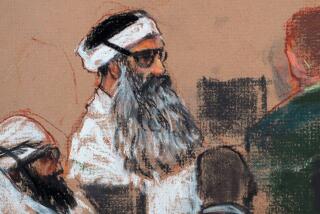Army judge: Al Qaeda operatives don’t have to attend proceedings
FT. MEADE, Md. — The U.S. Army judge who will try Khalid Shaikh Mohammed and four other top Al Qaeda terror operatives ruled Monday that the defendants cannot be forced to attend the legal proceedings, striking a significant blow to the government’s position that they must be in the courtroom as prosecutors seek their deaths in the Sept. 11 terror attacks.
The decision by Judge James Pohl came after Mohammed and his comrades sat quietly during the opening of a new round of pre-trial hearings, in stark contrast to their courtroom protests in May during their arraignment at the U.S. Naval Base at Guantanamo Bay, Cuba.
In May the defendants sought as a group to disrupt the proceedings. One detainee was restrained, several refused to listen to Arabic translations on headphones and some ignored the judge. Two of them abruptly stood to pray.
But on Monday, all of the men remained silent, led by Mohammed, who was dressed in traditional robes, a black vest and a white turban. His long, thick beard was dyed red, apparently from henna, and his four “brothers” sat silently behind him next to their own legal defense teams.
Mohammed is the accused mastermind of the attacks, serving just under then-Al Qaeda leader Osama bin Laden. The others defendants are Ramzi Binalshibh, the alleged plot cell manager; Walid bin Attash, an alleged Al Qaeda training camp steward; and Mustafa Ahmed Hawsawi and Ammar al Baluchi, a.k.a. Ali Abdul Aziz Ali, alleged Al Qaeda financiers.
Monday was the opening day in a weeklong pre-trial hearing dealing with 25 legal disputes in the only trial arising out of the Sept. 11, 2001, terror attacks. The defendants are named in 87 charges, including conspiracy, murder, aircraft hijacking and terrorism. Roughly 3,000 people died in the New York, Virginia and Pennsylvania assaults. A trial is tentatively set for next May.
The government asked the judge to force all five defendants to appear at all court hearings and the trial, and not be allowed to stay in their jail cells to mount a protest against the military commission trial.
Brig. Gen. Mark Martins, the chief prosecutor, argued that under the military commission rules, the defendants had no “right to refuse” to attend the hearings and trial. “The government should not be forced to proceed against empty chairs,” Martins said.
But defense lawyers said the defendants should not for compelled to sit through the long, all-day hearings and eventual trial. “There may be reasons why our clients don’t want to come to court on a particular day,” said James Harrington, an attorney for Binalshibh. “Our clients may believe they don’t want anything to do with this court, that they don’t recognize the court.”
Air Force Capt. Michael Schwartz, representing Attash, said: “If my client feels like this process allows him to adequately defend himself, he would like to be here. But when the government says this process is humane, we should have the opportunity to refute that. The physical and emotional strain is relevant into whether they are going to want to come into court or not.”
Schwartz said the government wants them all in the courtroom to give the proceedings “the appearance of justice.”
Judge Pohl said that the defendants “can choose to voluntarily not attend a session, as long as he understands his right to be present and also has the option not to attend.”
He then told each of the five men that every morning, if they wanted to stay behind in their holding cells where they can monitor the proceedings on a video feed, they must sign a waiver of their rights to be there.
ALSO:
Now we know: Swordfish have huge blue eyeballs
American? Prove it: Justices to rule on voter proof of citizenship
Celebrating Little Nemo by Winsor McCay; his ‘demons’ made him do it
More to Read
Sign up for Essential California
The most important California stories and recommendations in your inbox every morning.
You may occasionally receive promotional content from the Los Angeles Times.











